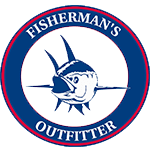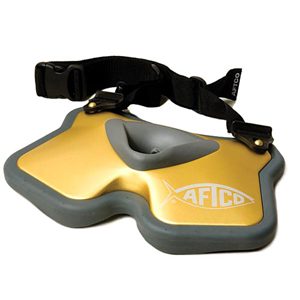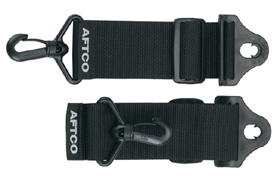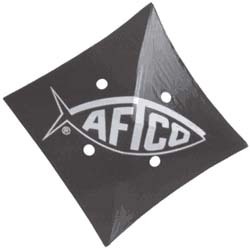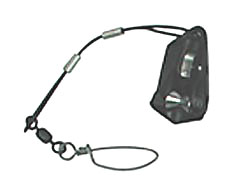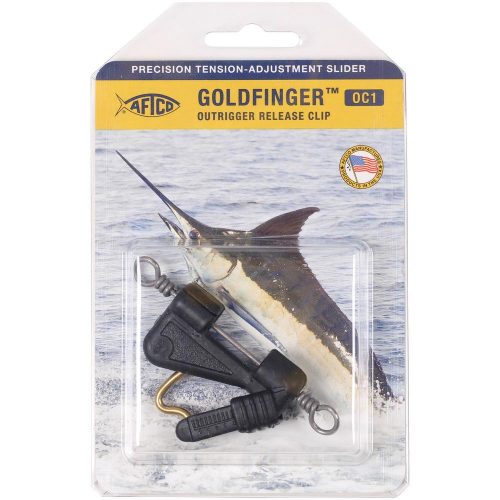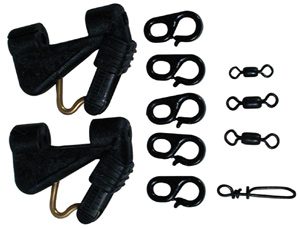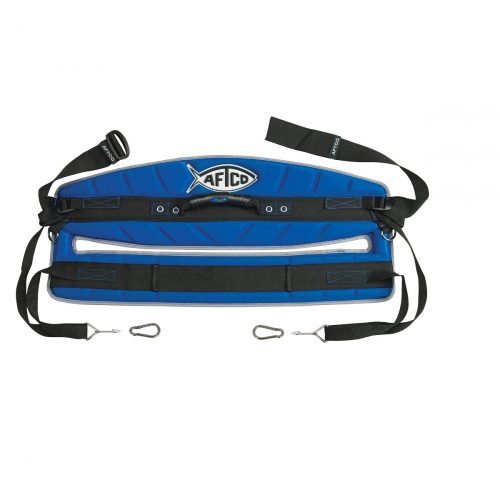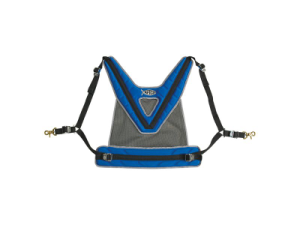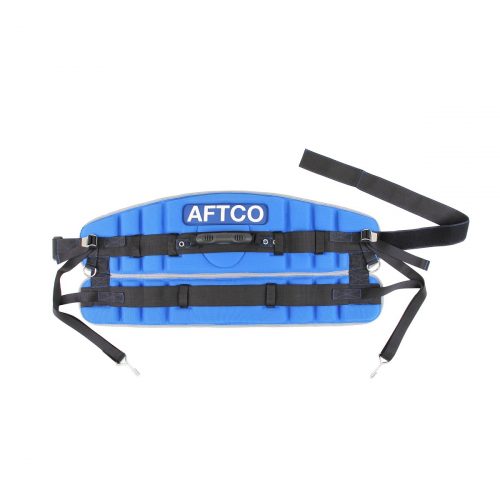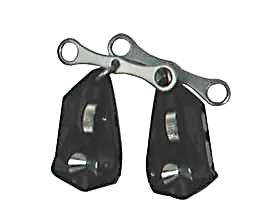AFTCO
AFTCO has come a long way from humble beginnings. In the first part of BlueWater’s series on the brands that built sportsfishing, Rick Gaffney profiles one of the world’s most readily recognized manufacturers of gamefishing hardware and accessories……..
Forty-five years in the business have made the letters AFTCO and the highly recognisable AFTCO logo, symbols of quality to the world’s sportsfishing community.
AFTCO Mfg Co Inc was started by J C Axelson in the basement of his oceanfront California home in 1957. Axelson was a big-game fisherman, who was dissatisfied with the performance of roller guides and roller tips on the market at the time.
As a master machinist, and owner of the Axelson Mfg Company, he had the equipment and know-how to develop and improve the current technology.
Axleson Mfg employed over 1000 people and manufactured equipment ranging from machine tools, to tooling for the oil industry and aircraft landing gear. However, in the basement of Axelson’s home on a double bayfront lot on posh Lido Island, in Newport Beach, was one of the best-equipped machine shops in Orange County. It was here that Axelson toiled, sparing no expense in developing what he considered to be the ultimate roller guide. His effort was more of a labour of love than a business venture.
Once the basic design and development had been completed, he moved his roller guide operation to a small manufacturing facility in Newport Beach. The first AFTCO roller guide was sold on October 28, 1958.
From the beginning, nothing less than perfection was tolerated. It was said that even the floor in the production area was painted, and that it was kept clean enough to eat off.
An early example of Axelson’s focus on perfection was the testing machine he developed that would allow line to continually run over his roller guides to test for wear and ease of turning. AFTCO still takes an updated version of this machine to tackle shows to demonstrate the line wear superiority of roller guides versus ring guides.
One day Axleson discovered that a slight change in the angle of the vee in the roller would improve its ability to turn. He promptly threw out his existing inventory of rollers, even though they were the best on the market at the time, because he knew the revised design was better.
Due his uncompromising approach, plus his knowledge of manufacturing, and his attention to detail, the AFTCO name began to build its reputation for quality in the international big-game fishing community.
BUSINESS FOR SALE
When Axelson passed away in 1973, his wife sold the business. As fate would have it, her accountant was the same one used by Milt Shedd. Milt was an accomplished saltwater angler and Chairman of SeaWorld Inc, which he co-founded in 1964. He had used AFTCO gear and was familiar with the quality and reputation of its products. Not surprisingly, he quickly became interested in buying the company.
Milt and his wife, Peggie, eventually bought AFTCO in 1973. At the time the company operated out of a 2400 square-foot rented building, and its product line consisted of two styles of roller tips and two styles of roller guides. In 1974, their son, Bill Shedd, came onboard and remains today as the company’s president.
By 1978, the Shedds had built a 24,000 sq ft industrial building to house the business. Today it produces the original products developed by J C Axelson, along with such innovations as: Big Foot roller guides and tips for the heaviest line classes; lightweight roller guides and tips for line classes down to 2kg test; Unibutts; Roller Troller Outrigger release clips, and Taper-Tip gaffs and bait nets.
All these products were developed as a result of time spent on the water by AFTCO staff members. Milt Shedd alone has spent over 3000 days at sea.
BETTER BUTTS
The introduction of the AFTCO aluminum butt and, ultimately, the AFTCO Unibutt is an interesting tale.
In 1975, Bill Shedd took a month-long sales trip from Miami to Boston to visit AFTCO customers on the US East Coast. During that trip he learned that there were several machine shops making aluminum butts. Many of the custom rod builders he visited preferred the aluminum butts over the wooden equivalents, but they complained about weight and inconsistent supply.
Shedd began to wonder if AFTCO could find a way to produce a lighter aluminum butt, efficiently and in large quantities, figured that they should be able to capture a large part of the aluminum butt business.
Upon his return, Bill and the AFTCO engineers began to explore ways of making aluminum butts other than by the common machining method, but they found no solution. However, while discussing the problem during a fishing trip with his father aboard the Sea World, Milt suggested they visit his friend, Jim Easton, from the James D Easton company. Easton was a world leader in the swaging of aluminum, a process that resulted in products that were strong, yet lightweight. Easton’s swaged aluminum bats are familiar to baseball players the world over.
As luck would have it, Easton had recently tried to manufacture an aluminum butt through the same swaging process he used to make baseball bats, arrows and a number of other successful products. He had abandoned the rod butt project, but talked to the Shedds about how that effort might be resurrected in partnership with AFTCO. This working relationship between AFTCO and the James D Easton Co resulted not only in the development of the world famous AFTCO aluminum butt in 1976, but the AFTCO Unibutt that followed in 1979.
TRADE MARKED
The shapes of AFTCO roller guides, roller tips and Unibutts are so distinctive and well known that AFTCO has obtained trademark rights on its products.
In 1989, AFTCO began a sportswear division under the name AFTCO Bluewater. The first product developed was a pair of fishing shorts, which have become the world’s best-known and most functional fishing shorts. Today, AFTCO Bluewater is a marine theme, coastal lifestyle sportswear line that features not only the AFTCO Bluewater label, but also licenced sportswear lines for the IGFA, and renown marine artists, Guy Harvey and Wyland, as well.
Any detailing of AFTCO’s history would not be complete without some mention of the company’s continuing and long-standing marine conservation and enhancement efforts. The driving force behind those efforts is Milt Shedd’s belief that, along with the SeaWorld success and the benefits received by the Shedd family for that success, comes the responsibility to give back to the ocean and the creatures that call it home.
The Shedd family, along with AFTCO and its employees, has made major financial and time contributions toward various marine resource activities. Some of those efforts include Milt and Peggie Shedd’s founding of the Hubbs-SeaWorld Research Institute, which has become one of the major marine research entities in the country, and Bill Shedd’s co-founding of United Anglers of Southern California (UASC).
One specific example of Milt and Bill’s involvement is California’s white seabass hatchery program. It was Milt who started the program and Bill and Milt who led the sportfishing community’s effort to develop funding for the hatchery.
Indeed, AFTCO and its people have contributed thousands of hours of leadership within the sportsfishing community, including efforts such as gillnet and longline bans and progress toward creating a Rigs-To-Reefs program in California. AFTCO and its people are also responsible for eliminating California’s experimental shark longline fishery and for blocking the development of a swordfish and tuna longline fishery
in 1992.
The AFTCO Tag/Flag Tournament, which involves many major sportsfishing conservation organizations and the sportsfishing media, has helped to elevate awareness and promote participation in the tag and release of gamefish.
The name AFTCO originally was an acronym, which stood for the Axelson Fishing Tackle Mfg Co Inc. The sportsfishing community began to use the AFTCO acronym over the full Axelson name, and over time the community began to assume that AFTCO stood for the American Fishing Tackle Co. And AFTCO’s clothing business customers often had no knowledge of what AFTCO stood for.
To help clarify and explain the AFTCO acronym to clothing customers, in 2000 AFTCO officially registered the American Fishing Tackle Company name with the US Patent and Trademark Office.
Over the 45 years it has been in business, AFTCO has established itself as a leader in the sportsfishing industry, thanks to its product innovation, focus on quality, and extensive commitment to sportsfish conservation and the broader sportsfishing industry and community.
Given the company’s ethos and commitment we couldn’t think of a better brand with which to kick-off our Brands that Built Gamefishing series.
-
AFTCO CLARION 80-UNLIMITED
$234.99 -
AFTCO DROP STRAP KIT
$25.99 -
AFTCO FISHING KITE
$109.99 – $119.99 -
AFTCO FLAT LINE CLIP
$39.99 -
AFTCO KITE CLIP KIT
$39.99 -
AFTCO MAXFORCE HARNESS
$179.99 -
AFTCO MAXFORCE XH HARNESS
$229.99
